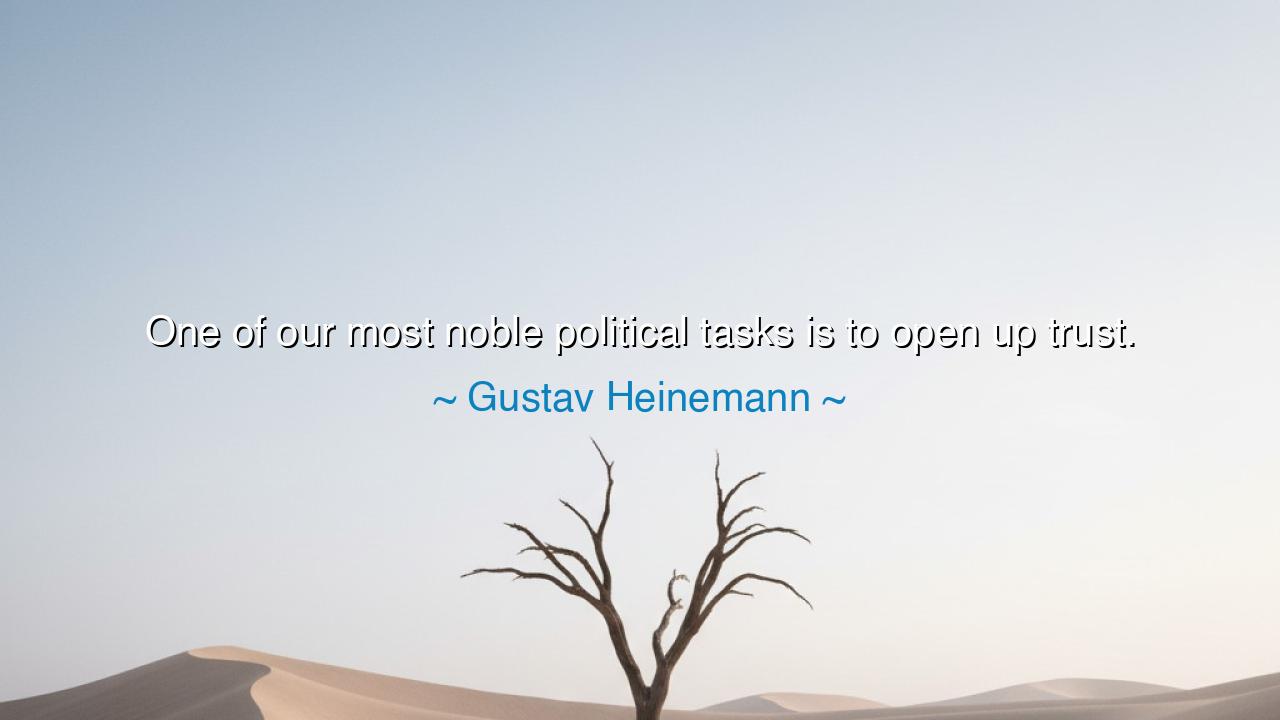
One of our most noble political tasks is to open up trust.






In the solemn words of Gustav Heinemann, “One of our most noble political tasks is to open up trust.” This declaration is not the rhetoric of a politician seeking applause, but the wisdom of a statesman who endured the storms of tyranny and sought to rebuild a shattered people. Heinemann, who lived through the dark years of Nazi Germany and later became President of the Federal Republic, understood that politics is not merely about laws and power, but about the creation of bonds between rulers and the ruled, between nation and neighbor, between past wounds and future hope.
The heart of his statement lies in the phrase open up trust. Trust is not a treasure that can be commanded, nor a fortress that can be seized; it is a door that must be opened. And to open it requires vulnerability, patience, and courage. In politics, this means transparency, honesty, and the willingness to risk misunderstanding in order to be truthful. For a people betrayed by lies and oppression, trust cannot be demanded—it must be offered and nurtured until it grows strong again. Heinemann calls this work not simply useful, but noble, for it is the foundation of peace and justice.
History gives us vivid testimony. After the horrors of the Second World War, Germany stood not only in ruins of stone, but in ruins of spirit. Its leaders faced the immense challenge of regaining the trust of their own people and the trust of the world. Some nations demanded only punishment, but Heinemann and others believed that the path forward was to rebuild trust through democracy, reconciliation, and responsibility. This long process, though difficult, eventually allowed Germany to return to the community of nations. Without the opening of trust, peace in Europe would have remained a fragile illusion.
The same truth can be seen in other moments of history. Consider Nelson Mandela, who emerged from decades in prison not with bitterness, but with the resolve to open trust between Black and white South Africans. He understood that if he ruled with vengeance, the cycle of hatred would never end. By choosing forgiveness and reconciliation, he opened the door of trust, and in doing so, prevented his nation from plunging into civil war. His politics were noble not because they were clever, but because they were rooted in the highest calling: to restore trust where it had been destroyed.
The deeper meaning of Heinemann’s words is that politics without trust is tyranny, while politics with trust is community. A state built on fear and suspicion may command obedience, but it cannot win loyalty. Only where leaders open trust, where citizens believe that their voices are heard and their dignity respected, can true democracy flourish. To open trust is to transform politics from a struggle for power into a covenant of shared responsibility.
The lesson for us today is clear: whether in nations, in communities, or in families, trust is the lifeblood of harmony. Leaders must be honest, even when honesty is difficult. Citizens must engage, not withdraw, even when disappointed. Each of us carries a portion of this noble task, for trust is not the duty of rulers alone, but of all who wish to live together in peace.
Practically, this means practicing transparency in our own dealings, keeping promises, listening before speaking, and showing mercy when we might demand punishment. On the larger stage, it means supporting leaders who act with integrity, holding them accountable when they betray trust, and working always to build bridges rather than walls. For in a world torn by suspicion, to open up trust is not weakness but the highest form of strength.
Thus, Gustav Heinemann’s words shine as a beacon across generations: the noblest task of politics is not conquest, not wealth, not even victory—it is the opening of trust. Where trust is opened, peace is possible; where trust is shut, only fear and division remain. Let us, then, take up this noble work, in our public life and in our private hearts, and become builders of trust in a world that so desperately needs it.






NPpositive no pro
Heinemann’s statement suggests a very idealistic view of political leadership, where trust is not just given but actively fostered. But I wonder, can trust really be opened up in a system that’s so complex and polarized? Is there a role for transparency, accountability, and communication in opening up trust, or are these efforts often overshadowed by the dynamics of power and control that define political systems?
HDNguyen Hoang Dung
I find Heinemann’s perspective on trust in politics both hopeful and challenging. But it leads me to ask—how do we know when trust has truly been opened up, and when it’s just a political facade? Can political leaders really open up trust in a way that transcends party lines, or is trust inherently something that has to be earned from each individual over time?
LTminh thu le thi
The idea of trust as a noble political task really speaks to the heart of effective leadership. But is it enough to simply 'open up' trust, or is maintaining it just as important? In a political landscape filled with divided opinions and constant scrutiny, how do leaders ensure that the trust they open up is not quickly eroded? What are the practical ways this kind of trust can be cultivated and sustained?
NTQuang Nguyen Tien
Heinemann's quote about trust in politics is striking because it emphasizes the idea that trust isn’t just a passive element—it’s something that requires active effort to create. But how can political leaders truly 'open up' trust in today’s world, where skepticism and misinformation are widespread? What steps can be taken to restore public faith in politics, and can it ever be completely rebuilt once broken?